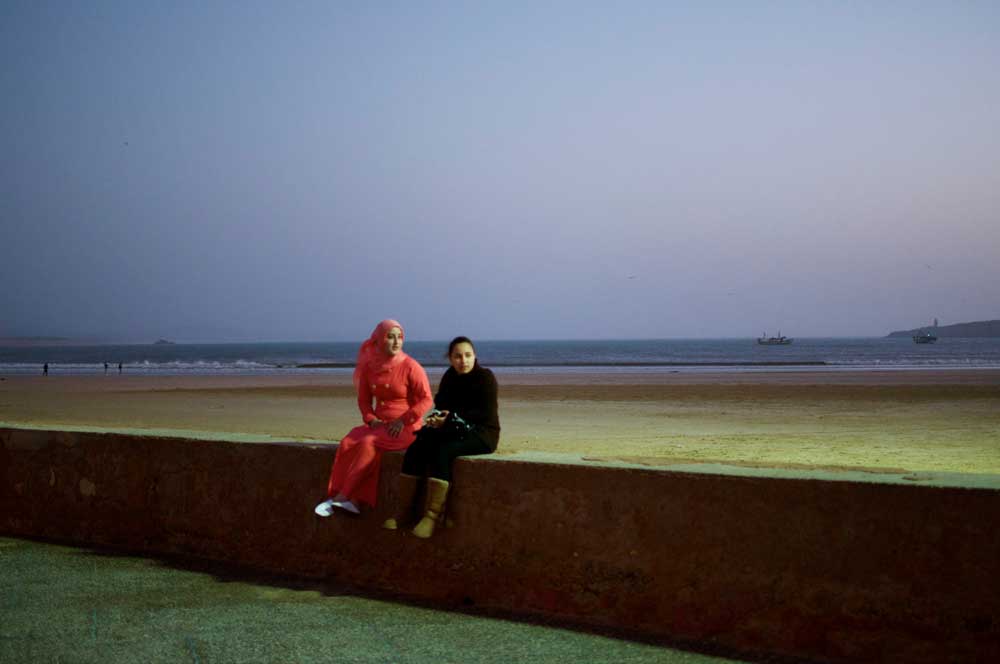Task 34 – Take responsibility for everything
Task 34
Take responsibility for everything

Such an evocative picture could have been ruined by a plastic bag on the ground, an excavator on the beach or by the light being different a half hour before or after. If that was the case, then you could have something to blame if the picture was a failure. But it never helps to assign blame; it does not make any photographer a better one. The only thing you could have done was to clear some things out the picture, change the camera position or come back later on. You yourself are responsible for everything in the picture. Fortunately, no excuses were necessary here.
Essaouira, Morocco, 2015. Photo: Gry Sissel Opsvik
Problem
Not taking responsibility
I was unsatisfied with my life. I thought I had deserved more and thought that circumstances around me should have been different. But then I read the best advice I have ever had in my whole life: You have to take 100% responsibility for everything that happens in your life. That is 100%, not 99, 50 or 30.
Suddenly, it was as if tension had been released and everything fell into place. I stood alone with responsibility for myself. In return, I gained full power. Everything was up to me. Although I was not to blame for the circumstances, I had responsibility for dealing with them.
At my doctor’s office, one thing has become clear to me: Those who will take the least responsibility for their lives, health and troubles are the sickest. They want me to find a diag- nosis that can free them from having responsibility. All too many of them want a pill rather than to change. The rarest question that I get at the office is someone asking about what they can do themselves to improve their health.
Taking responsibility gives you power. Blaming others leads nowhere. It is important here to distinguish between blame and responsibility. You can take responsibility for something even if it is not your fault. Although a patient is not necessarily to blame for their illness, they have to take the most possible responsibility for their own recovery.
There can be several reasons for people not taking responsibility. Many are uninformed about the importance of it. Even I was unaware of how efficient it is. Others can refuse due to laziness or an unwillingness to exert themselves. In addition, there are many people who refrain because of extreme shame or guilt. They take on the blame for ending up where they are, but not the responsibility for getting out of it. There is seldom any point in finding out who is to blame or having a guilty conscience. The best antidote, however, is to take respon- sibility for getting things in order. If you allow yourself to be paralyzed by guilt, you lose you power to change.
Shame and a guilty conscience can be beneficial for us in smaller doses. Some guilt and shame has historically been necessary for adjusting to the social life in the tribe. People wit- hout shame or without a conscience don’t amount to much.
Does any of this sound familiar to you? Do you know others like this? Who can you learn from? To which degree do you influence your surrounding if you exude a feeling of guilt, or a sense of responsibility?
How relevant is this issue for you on a scale of 1 to 6?:
Solution
Taking full responsibility
I went to a photo workshop with the legendary Mary Ellen Mark in Mexico. There I photograph- ed a family that began to fuss about getting shoes and t-shirts. When I complained about this, she said, “Buy the shoes! You yourself are responsible for everything inside the picture frame. If something hinders you in taking the picture you want, then it is your responsibility to solve the problem.”
At photo workshops, excuses are rampant. “The light is not right.” “I was feeling a little ill.” “The excavator stood in the way.” “These people are so difficult to approach.” Fortunately, photographers learn quickly that excuses have no value and that they never make the picture better. If something is in your way and ruins the composition, then you have to remove it, move your position to conceal it or find something else to photograph. If people don’t want to be photographed, then you have to change your approach so that you can create some goodwill so that they will accept you.
By taking responsibility fully, the effect of this will be immediate. The photos we take will be better. In life otherwise the consequences can be more difficult to see. Often they appear so long afterward that the connection between cause and effect is hidden from us.
Get used to question on all of the excuses that appear. Remind yourself that you are in charge 100%. What about changing your most used password to something that has to do with responsibility? Then you will have a daily reminder. As soon as you take full responsibility you lose the possibility of blaming others, and at the same time you get the chance to change things instead of waiting for people and circumstances to change.
PHOTO ASSIGNMENT:
Go to a place you know that will be challenging to photograph.
Don’t accept the excuses that emerge. Take responsibility for everything in the picture – absolutely everything!
How useful on a scale of 1 to 6 was this task for you?:
BOOK SUGGESTION: Excuses Begone! by Wayne Dyer
❞
He that is good for making excuses is seldom good for anything else.
Benjamin Frank
❞ Everything you do is based on the choices you make. You can’t blame your parents, past relationships, your job, the economy, the weather or your age. You, and only you, are responsible for every decision you make.
Wayne Dyer
❞ A complaint is a transfer of pain, anger and hopelessness to another human being.
Per Fugelli
[note_editor]

